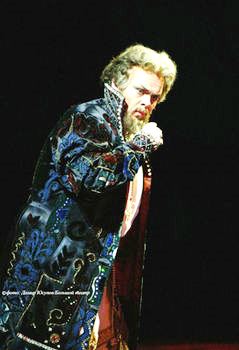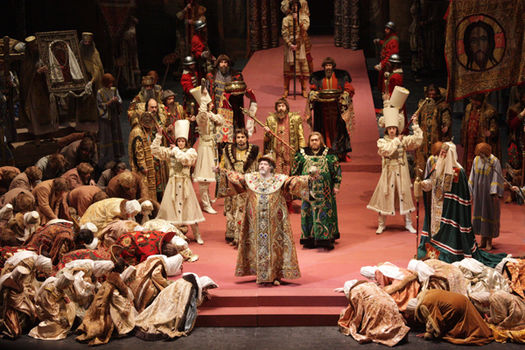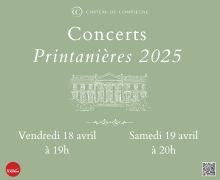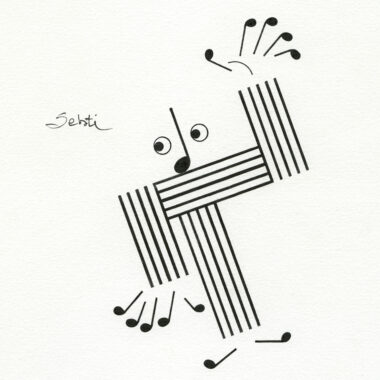Plus de détails
Moscou. Théâtre Bolchoï. 21-IV-2014. Modeste Moussorgski (1839-1881) : Boris Godounov, drame populaire en un prologue et trois actes sur un livret du compositeur (version Rimski-Korsakov – 1872). Mise en scène : Leonid Baratov (1948), recréée par Igor Ushakov (2011). Décors : Fyodor Fedorovsky, recréés par Alyona Pikalova. Costumes : Fyodor Fedorovsky, recréés par Elena Zaytseva. Chorégraphie: Leonid Lavrovsky, recréée par Ekaterina Mironova. Lumières : Sergei Shevchenko. Avec : Mikhail Kazakov, Boris ; Elena Novak, Féodor ; Kristina Mkhitaryan, Xénia ; Evgenia Segenyuk, la Nourrice ; Vitali Taraschenko, Chouiski ; Andrei Grigoriev, Tchelkalov ; Alexander Naumenko, Pimène ; Mikhail Gubsky, Grigori ; Elena Manistina, Marina Mnishek ; Vyacheslav Pochapsky, Varlaam ; Irina Rubtsova ; Elzbieta Ardam, l’Hôtesse ; Marat Gali, l’Innocent ; Vladimir Krasov, Nikititch ; Leonid Bomshteyn, Boyard Khruchtchov ; Vadim Tikhonov, Missail un vagabond ; Alexander Korotky, Mityusha un paysan ; Elena Okolysheva, Irina Udalova, deux femmes. Chœurs et Orchestre National du Théâtre du Bolchoï. Chef de chœur : Valery Borisov. Direction : Pavel Sorokin.
 If there is an iconic opera at the Bolshoi Theatre, which is within walking distance of the Kremlin, it is Boris Godunov. By its size and cost, an opera house is in itself an affair of state. This was particularly true in the former USSR, where classical music played a crucial cultural role, and is still the case in today's Russia at the Bolshoi Theatre, whose lavish restoration was peppered with multiple delays and suspicion of corruption.
If there is an iconic opera at the Bolshoi Theatre, which is within walking distance of the Kremlin, it is Boris Godunov. By its size and cost, an opera house is in itself an affair of state. This was particularly true in the former USSR, where classical music played a crucial cultural role, and is still the case in today's Russia at the Bolshoi Theatre, whose lavish restoration was peppered with multiple delays and suspicion of corruption.
A performance of Boris Godunov at the Bolshoi is not solely an opera performance; it is a theatrical manifestation of Russian power as it represents itself. Hence, transposing the action to modern times, as Western directors such as Calixto Bieito or Graham Vick do, is irrelevant. For Moscow, the basic staging of reference is that of Leonid Baratov, a production that dates back to 1948 and which was awarded the Stalin Prize in 1949. Recreated in 2011, this is among the oldest productions performed today.
Can such an old interpretation be justified by any argument other than the opportunity to appreciate a piously-preserved staging? For a foreign visitor, the experience is fascinating, as one receives a lesson in music and history that few opera houses in the world can match. The size of the chorus that unfolds on the big stage, the incredible magnificence of the costumes in the Coronation scene, the care lavished on every moment so that it has the strongest and most immediate impact (both the Coronation and the Polish scene, set in a leafy courtyard of the castle, delighted the audience), all of that combined makes this production the « popular drama » sought by Mussorgsky.
 At the Bolshoi, “popular” is understood to be a drama designed for the enjoyment of all the people. This objective of pleasing the largest audience explains why the Rimsky-Korsakov version of 1872, which follows the traditional standards of the opera, is preferred over the original version of 1869 by Mussorgsky. The addition of the Polish garden scene, with its tenor/soprano duet, has the advantage of providing a shimmering visual breath of air, but unfortunately, musically, it is conventional and dramatically, uninteresting.
At the Bolshoi, “popular” is understood to be a drama designed for the enjoyment of all the people. This objective of pleasing the largest audience explains why the Rimsky-Korsakov version of 1872, which follows the traditional standards of the opera, is preferred over the original version of 1869 by Mussorgsky. The addition of the Polish garden scene, with its tenor/soprano duet, has the advantage of providing a shimmering visual breath of air, but unfortunately, musically, it is conventional and dramatically, uninteresting.
Wih regard to the casting, it is homogeneous and of high quality; of particular note, Vitali Taraschenko's Councilor Chouiski and, especially, the Boris of Mikhail Kazakov, who started his career at the Bolshoi and played the title role at the young age of 30. Not yet 40, he portrays the infanticide guilt-ridden tsar masterfully and the Shakespearian monologue of Act II, when he believes he sees the Tsarevich back from the dead, is superb acting. Even if Putin was not in the audience tonight, as he was otherwise occupied with the Ukrainian situation, Boris Godunov in Moscow is definitely the Tsar of operas.
Plus de détails
Moscou. Théâtre Bolchoï. 21-IV-2014. Modeste Moussorgski (1839-1881) : Boris Godounov, drame populaire en un prologue et trois actes sur un livret du compositeur (version Rimski-Korsakov – 1872). Mise en scène : Leonid Baratov (1948), recréée par Igor Ushakov (2011). Décors : Fyodor Fedorovsky, recréés par Alyona Pikalova. Costumes : Fyodor Fedorovsky, recréés par Elena Zaytseva. Chorégraphie: Leonid Lavrovsky, recréée par Ekaterina Mironova. Lumières : Sergei Shevchenko. Avec : Mikhail Kazakov, Boris ; Elena Novak, Féodor ; Kristina Mkhitaryan, Xénia ; Evgenia Segenyuk, la Nourrice ; Vitali Taraschenko, Chouiski ; Andrei Grigoriev, Tchelkalov ; Alexander Naumenko, Pimène ; Mikhail Gubsky, Grigori ; Elena Manistina, Marina Mnishek ; Vyacheslav Pochapsky, Varlaam ; Irina Rubtsova ; Elzbieta Ardam, l’Hôtesse ; Marat Gali, l’Innocent ; Vladimir Krasov, Nikititch ; Leonid Bomshteyn, Boyard Khruchtchov ; Vadim Tikhonov, Missail un vagabond ; Alexander Korotky, Mityusha un paysan ; Elena Okolysheva, Irina Udalova, deux femmes. Chœurs et Orchestre National du Théâtre du Bolchoï. Chef de chœur : Valery Borisov. Direction : Pavel Sorokin.







